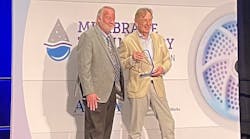A major commercial laundry in Los Angeles has helped the Metropolitan Water District of Southern California launch a new industrial water conservation program that pays an incentive for new water-saving improvements.
Republic Master Chefs and its parent company American Textile Maintenance installed $390,000 of new equipment and systems that will save up to 16.5 million gal of water per year--or as much as 38% of the laundry's annual water usage--and will receive an incentive from Metropolitan for the project's water savings.
Metropolitan's first incentive payment to American is $19,500. The second half of the incentive will be based on actual water savings and will be calculated at the end of the first year of operation.
The new Industrial Process Improvement Program is open to all businesses in Metropolitan's six-county, 5,200-square-mile service area.
"As a businessman, I'm very pleased to see this new program that's been designed to benefit business and Metropolitan," said Metropolitan board chairman Wes Bannister. "Businesses want to save money; Metropolitan wants to save water."
The new Industrial Process Improvement Program also gets money to the business faster, helping to cushion the cost of what is often a major up-front investment. "The IPI Program gives a business or industry half of the incentive payment at start-up, which is of huge importance when a business has invested that kind of money up-front," said Deneice Cotton, the program manager. "The balance is paid after a one-year monitoring period to verify actual water savings," Cotton said.
The program offers businesses $2.36 per 1,000 gal of water saved for one year; 50% of the project's water-related improvement costs or buy-down of project cost to reduce simple payback to two years--whichever is less.
"We're glad to be Metropolitan's first business to receive an incentive under the revised program," said Brad Shames, Republic Master Chefs president, "but this isn't our first water conservation systems upgrade. "We are already seeing reduced water use from an earlier installation of tunnel washers that move laundry through a series of modular units, dispensing the precise amount of cleaning agents at the proper time, thereby requiring far less water than conventional washers," Shames said. That upgrade received incentives from the city of Los Angeles' Department of Water and Power Technical Assistance Program.
The third-generation family business on Washington Boulevard near downtown Los Angeles leases, delivers, washes and returns restaurant and bar linens, towels and uniforms. Shames and Paul Litwin, the company's chief engineer, worked closely with Norchem Corp. to upgrade their washwater and wastewater systems.
Republic is reclaiming washwater leaving the tunnel washers, which is collected and pumped to a shaker to separate out solids. Next, suspended solids are removed before the water passes through ceramic filters for purification. The water is then pumped into a holding tank (with no heat loss) before being returned to the tunnel washers for reuse. The project also lowers sewer discharge costs, and typically, energy and operational costs also decline, resulting in additional savings.
Source: Metropolitan Water District

